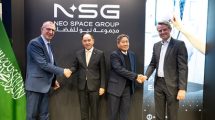 Global policymakers, governments, industry, academia, and emerging space players from the public and private sectors were in attendance at The Abu Dhabi Space Debate (ADSD). The two-day event ran on December 10 and 11, where participants debated critical issues, such as space governance and global collaboration, and the opportunities to protect the future of space.
Global policymakers, governments, industry, academia, and emerging space players from the public and private sectors were in attendance at The Abu Dhabi Space Debate (ADSD). The two-day event ran on December 10 and 11, where participants debated critical issues, such as space governance and global collaboration, and the opportunities to protect the future of space.
Prominent event attendees included H.E. Omran Sharaf, Assistant Minister, Ministry of Foreign Affairs (MOFA); H.E Salem Butti Al Qubaisi, Director General, UAE Space Agency; H.E. Salem Humaid Al Marri, Director General, Mohammad Bin Rashid Space Center (MBRSC); and H.E. Dr. Eng. Mohammed Nasser Alahbabi, Senior Advisor, Space and Cyber Technologies, EDGE.
Other notable participants included Hiroshi Yamakawa, President, Japan Aerospace Exploration Agency; Teodoro Valente, President, Italian Space Agency; Dr. Tidiane Ouattara, President, African Space Council; Dr. Sherif Mohammed Sedky, CEO, Egyptian Space Agency; Sergey Krikalev, Executive Director for Human Space Flights, ROSCOSMOS; Jonathan Hung, Executive Director, Office for Space Technology and Industry, Singapore (OSTIn); Tim Marshall, Foreign Affairs and Geopolitics Writer; Karim Sabbagh, Managing Director, Space42; Max Haot, CEO, Vast; Dr. Mariel Borrowitz, Director of International Space Situational Awareness Engagement, Office of Space Commercials; Robbie Schingler, Co-Founder and Chief Strategy Officer, Planet Labs; Daniel Ceperley, COO and Co-Founder, LeoLabs; and Prof. Neil Morisetti, Vice Dean (Public Policy), Faculty of Engineering Sciences, University College London.
Throughout the second day, panels and keynote sessions discussed pressing topics related to space, including strategies to encourage international collaboration, responsible knowledge transfer, and enabling emerging markets. These discussions built on the first day’s focus to mitigate the overuse of space and ensure its benefits are accessible to all nations. The day concluded with a youth trial court that encouraged the next generation of leaders to set the future of space advancements.
Notable insights were identified across several debates. For instance, in the panel titled ‘Navigating New Frontiers: Are the UN’s Rules and Space Treaties Ready for the 21st Century?’, Teodoro Valente, President, Italian Space Agencyimpressed upon the need for space to remain a shared resource for all, highlighting the need for space treaties, regulations and frameworks to evolve to address modern challenges including the growth of satellites and constellations, the commercialisation of space and the potential for lunar resource extraction.
Speaking on the panel ‘Governance for the Future: Ensuring Space as a Shared Resource for Generations to Come’,H.E Omran Sharaf, Assistant Minister of Foreign Affairs emphasised the need for nations to strike a balance between national interests and global collaboration by highlighting how nations must serve their own interests, while recognising the complexity of space exploration.
Speaking on a panel titled ‘Amplifying Emerging Market Voices in Shaping the Global Space Dialogue’, H.E. Salem Humaid AlMarri, Director General, MBRSC, highlighted the UAE as a prime example for forging international partnerships to develop core capabilities. He cited the milestone achievements of MBRSC in developing space systems and capabilities locally, including for the anticipated MBZ-SAT, which is expected to be launched soon. AlMarri also spoke of the critical applications of satellites to gather data and intelligence from space to aid key players in making informed decisions.
In the panel discussion titled ‘Decentralised Space Situational Awareness: Balancing Free Access and National Security in Space’, H.E Dr. Eng Mohammed Nasser Alahbabi, Senior Advisor, Space and Cyber Technologies at EDGE, stressed on the growing need for enhanced space situational awareness for governments and national security in mitigating the risk of collisions and operational conflicts and the role it plays in facilitating collaboration between nations and commercial operators.














Add Comment